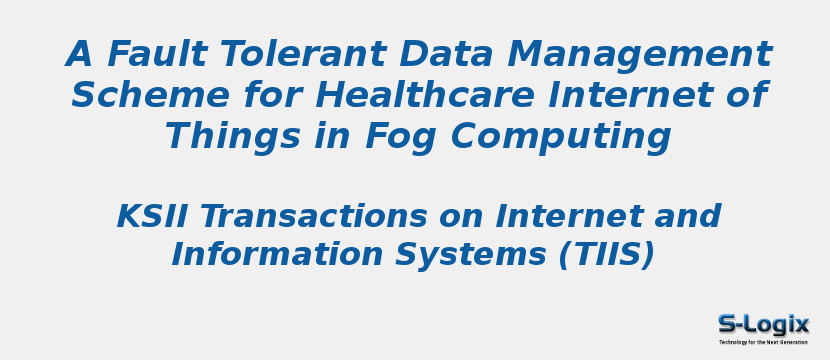Research Area: Internet of Things
Fog computing aims to provide the solution of bandwidth, network latency and energy consumption problems of cloud computing. Likewise, management of data generated by healthcare IoT devices is one of the significant applications of fog computing. Huge amount of data is being generated by healthcare IoT devices and such types of data is required to be managed efficiently, with low latency, without failure, and with minimum energy consumption and low cost. Failures of task or node can cause more latency, maximum energy consumption and high cost. Thus, a failure free, cost efficient, and energy aware management and scheduling scheme for data generated by healthcare IoT devices not only improves the performance of the system but also saves the precious lives of patients because of due to minimum latency and provision of fault tolerance. Therefore, to address all such challenges with regard to data management and fault tolerance, we have presented a Fault Tolerant Data management (FTDM) scheme for healthcare IoT in fog computing. In FTDM, the data generated by healthcare IoT devices is efficiently organized and managed through well-defined components and steps. A two way fault-tolerant mechanism i.e., task-based fault-tolerance and node-based fault-tolerance, is provided in FTDM through which failure of tasks and nodes are managed. The paper considers energy consumption, execution cost, network usage, latency, and execution time as performance evaluation parameters. The simulation results show significantly improvements which are performed using iFogSim. Further, the simulation results show that the proposed FTDM strategy reduces energy consumption 3.97%, execution cost 5.09%, network usage 25.88%, latency 44.15% and execution time 48.89% as compared with existing Greedy Knapsack Scheduling (GKS) strategy. Moreover, it is worthwhile to mention that sometimes the patients are required to be treated remotely due to non-availability of facilities or due to some infectious diseases such as COVID-19. Thus, in such circumstances, the proposed strategy is significantly efficient.
Keywords:
Author(s) Name: Saeed, Waqar, Jehangiri, Ali Imran, Mohamed, Nader , Umar, Arif Iqbal
Journal name: KSII Transactions on Internet and Information Systems (TIIS)
Conferrence name:
Publisher name: Korea Science
DOI: 10.3837/tiis.2021.01.003
Volume Information: Volume 15 Issue 1 / Pages.35-57 / 202
